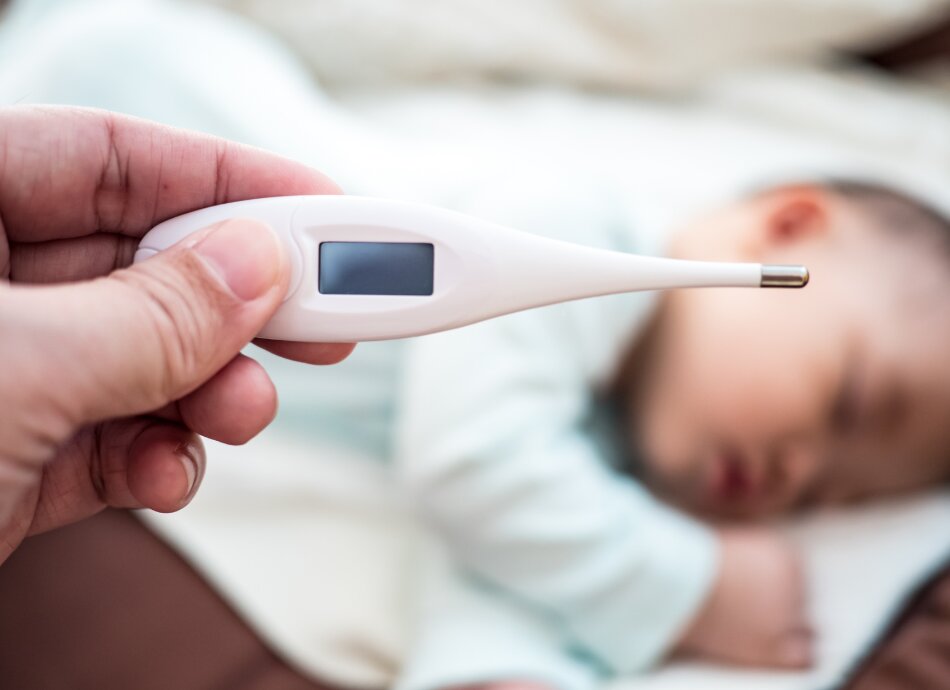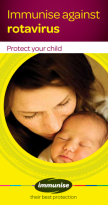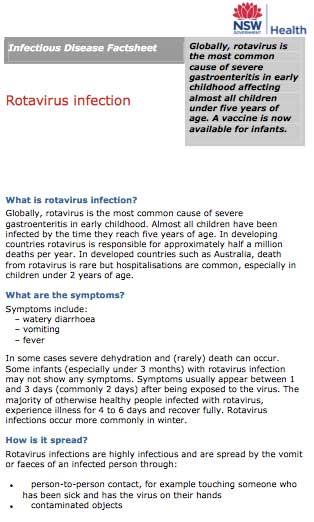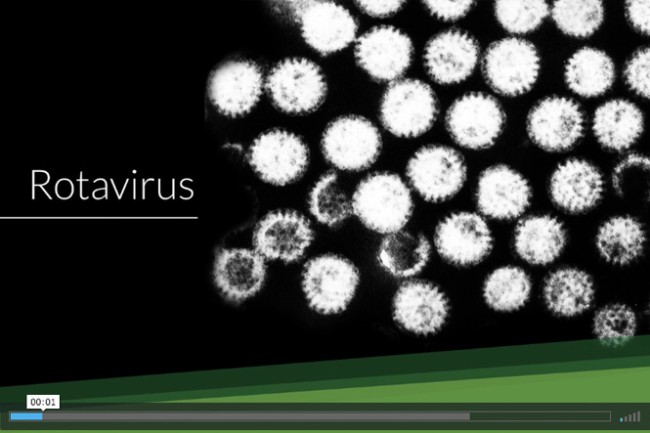Rotavirus
Commonly referred to as a tummy bug or stomach flu. Also known as gastroenteritis
Key points about rotavirus
- Rotavirus is a viral infection that causes fever, vomiting and diarrhoea, mostly in babies and young children.
- Vaccination against rotavirus is very effective in preventing infection and the serious complications it can cause.

Video: Rotavirus
This video may take a few moments to load.
(Immunisation Advisory Centre, NZ, 2017)
Rotavirus is spread from someone who has the virus or by contact with the faeces (poo, tūtae) of an infected child or adult. This can happen if you don't wash your hands:
- after changing nappies
- after using the toilet
- after touching toys or surfaces that have been in contact with the virus
- before handling food or eating.
People who have rotavirus infection have a large amount of rotavirus in their poo when they are sick, and for about a week after they feel better. Rotavirus can survive on your hands for at least 4 hours and on surfaces and objects for about 2 months. Without vaccination, almost all children have been infected by the time they reach 5 years old.
Rotavirus disease is most common in infants and young children, but older children and adults can get it too. Rotavirus carries the greatest risk of complications and hospitalisation for children:
- aged between 3 months and 2 years
- with a low birth weight who are still underweight
- with high-risk medical conditions (eg, heart or kidney problems, or diabetes).
If your child has a rotavirus infection, they usually develop a sudden fever, then vomiting and diarrhoea. The illness lasts from 3 to 8 days and includes:
- a fever that starts suddenly and usually lasts 1–2 days
- vomiting that lasts for about 3 to 6 days
- watery poos (diarrhoea) that last for about 5–6 days
- tummy (puku) pain.
Adults can be infected with rotavirus, but the symptoms are usually mild or they have no symptoms.
Rotavirus is not treated with antibiotics because it is caused by a virus, not a bacteria. The best thing to do if your child has rotavirus is to stop them becoming dehydrated by giving them small amount of fluids often, such as a quarter of a cup every 15 minutes or 1 teaspoon (5 mLs) in a syringe every minute. Keep offering your child fluids even if they are vomiting. Read more about preventing dehydration in babies and children.
Children from 3 months to 2 years are most at risk of severe dehydration. In babies 3 months or younger, the symptoms of rotavirus are usually mild or they have no symptoms. This is possibly due to the developing gut of newborns or the passive protection passed on from their mother’s antibodies during breastfeeding.
When to see a doctor
| See your doctor immediately if your child |
|
Children with diarrhoea or vomiting should not go to school or daycare until they until they are well and for 48 hours (2 days) after diarrhoea or vomiting has stopped.
Rotavirus is very infectious. It is easily spread by contact with poo from an infected person. To help stop rotavirus spreading, wash your hands thoroughly with soap and water or a hand-sanitising gel.
Vaccination is the best way to protect against rotavirus.
Without vaccination, almost all children will get rotavirus before they are 5 years old. Without vaccination, rotavirus results in:
- 1 in every 5 children needing to see a doctor by the time they are 5 years old.
- 1 in every 43 children needing hospital treatment for dehydration.
Vaccination against rotavirus is very effective. It prevents:
- 5–8 babies in 10 from severe rotavirus infection
- 9 in 10 from needing to be admitted to hospital because of rotavirus infection
- 5–7 in 10 from having any rotavirus diarrhoea.
Rotavirus vaccine
Rotavirus vaccine is an oral vaccine that is given as drops that are squirted into your baby’s mouth.
- In New Zealand, rotavirus vaccination is given free to babies as part of their 6 week and 3-month immunisation.
- If you miss these dates, you can catch up, with the first dose being given before 15 weeks old (the latest is 14 weeks and 6 days), and the second dose before 25 weeks old (the latest is 24 weeks and 6 days).
- Your baby can't have the rotavirus vaccine after 25 weeks because the risk of serious reactions increases after this age.
Read more about the rotavirus vaccine.
Immunise against rotavirus(external link) HealthEd, NZ
Rotavirus(external link) Immunisation Advisory Centre, NZ
ROTARIX® consumer information leaflet(external link) Medsafe, NZ
Rotavirus vaccine consumer educational Q&A (external link)Medsafe, NZ
Resources
Rotavirus vaccine(external link) Health New Zealand | Te Whatu Ora
Rotavirus infection – factsheet NSW Multicultural Health Communication Service, Australia. Available in the following languages: English(external link), Arabic(external link), Chinese (traditional)(external link), Farsi(external link), Khmer(external link), Korean(external link), Thai(external link), Vietnamese(external link), more languages(external link)
References
- Rotavirus(external link) Immunisation handbook 2017, NZ
- Immunise against rotavirus(external link) HealthEd, NZ
Immunisation Advisory Centre
Quick answers to frequent RotaTeq® questions – fact sheet for vaccinators(external link) 2017
Medsafe datasheet
Brochures

Ministry of Health, NZ, 2017

NSW Multicultural Health Communication Service, Australia
English, Arabic, Chinese (traditional), Farsi, Khmer, Korean, Thai, Vietnamese, More languages
Credits: Healthify editorial team. Healthify is brought to you by Health Navigator Charitable Trust.
Reviewed by: Dr Osman David Mansoor, Medical Officer of Health, Hawke’s Bay DHB; Ministry of Health, Public Health Group
Last reviewed:
Page last updated:






